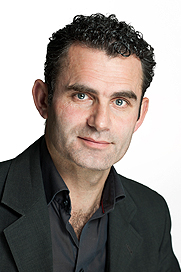‘5 redenen waarom ongelijkheid fout is’
- 16 oktober 2014
Vandaag is het Blog Action Day. Over de hele wereld bloggen, vloggen en verbeelden mensen het thema ongelijkheid. Ook jij kan meedoen! Oxfam Novib is partner van Blog Action Day. Onze directeur Campagnes blogt dus mee: ‘Right the inequality wrongs’.
 |
| Foto:H.P. Alting von Geusau/Oxfam Novib |
Tom van der Lee: Right the Inequality Wrongs
‘Extreme inequality is wrong, no matter from which perspective you look at it.
It's morally wrong, because it's not ethical that the 85 richest people in the world own just as much wealth as the poorest 3.5 billion people, of whom 800 million go to bed hungry everyday. And it’s now more wrong then ever, because extreme inequality is rising:
- In 1820 the world’s richest country – Britain – was about five times richer than the average poor country. Now the USA is 25 times wealthier than the average poor nation.
- 25 years ago the world’s richest 10% earned seven times more than the poorest 10%; now it’s 9,5 times more.
- Seven out of ten people live in a country were inequality has risen in the last 30 years.
Extreme inequality is politically wrong, because history has proven again and again that extreme inequality will ultimately lead to rebellion. No matter how violent and authoritarian a regime, people will turn to the pitchfork when they - and there children - are systematically robbed from the change to better their future.
In democratic states we see a growing debate on inequality; it’s not a coincidence that Obama has said that ‘inequality is the defining issue of our time’. However, steps to curb extreme inequality are far too often countered by powerful (financial) elites with a disproportionate amount of political cloud.
Extreme inequality is economically wrong - it was not only an important cause of the recent financial crisis and global recession - but there is growing scientific evidence that it’s counterproductive in terms of economic growth. Even economist from the IMF and World Bank are now acknowledging this. Optimists say, they see a new 'Washington consensus' emerging, one in which a harsh austerity approach is being replaced by appeals to invest more, also in public goods, to reduce extreme inequality. And when IMF and World Bank converse with a development organisation like Oxfam on a position that extreme inequality undermines economic growth, you know it’s gone beyond ideology.
Extreme inequality is socially wrong. A society in which a CEO earns 331 times more as average workers and 774 times as much as minimum wage earners, like in the USA, looses touch with what is a fair reward for hard labour, given the existence of big differences in opportunities. It doesn’t value people for what they do and contribute, because it is excessively focused on over rewarding a happy few. It creates a rat race between the haves and the have-not's, with the have-yachts as ultimate beneficiaries.
It’s also socially wrong that women earn far less for the same work than man, while research shows that both economic growth and poverty reduction would benefit if women’s paid employment rates were the same as men’s. However, if nothing happens we have to wait until 2075 before women receive equal pay.
Finally, extreme inequality is also ecologically wrong. There is a real ‘Climate Gap”, in the sense that poor people, responsible for by far the least amount of emissions, have been and will be most affected by climate change. Global warming not only causes an increase in the absolute number of people living in poverty, the damage caused by drought, floods and other climate related extreme whether events effect the poorest people – with the smallest carbon footprints - in the poorest nations the hardest.
Righting these five wrongs is a tall order. It will demand a lot of blood, sweat and tears form a lot of people all over the world to make things better. And it will take time, because fighting extreme inequality is not a one off event, but a continuous struggle for transformative changes. What we need is to mobilize the power of people against extreme inequality and poverty. What I ask of you is to join Oxfam, its partners and many others to be part of this. Because, fighting extreme inequality ensures a better, fairer and more sustainable future for you, your children and grand-children.’
Bron: Oxfam Novib, 16 oktober 2014





